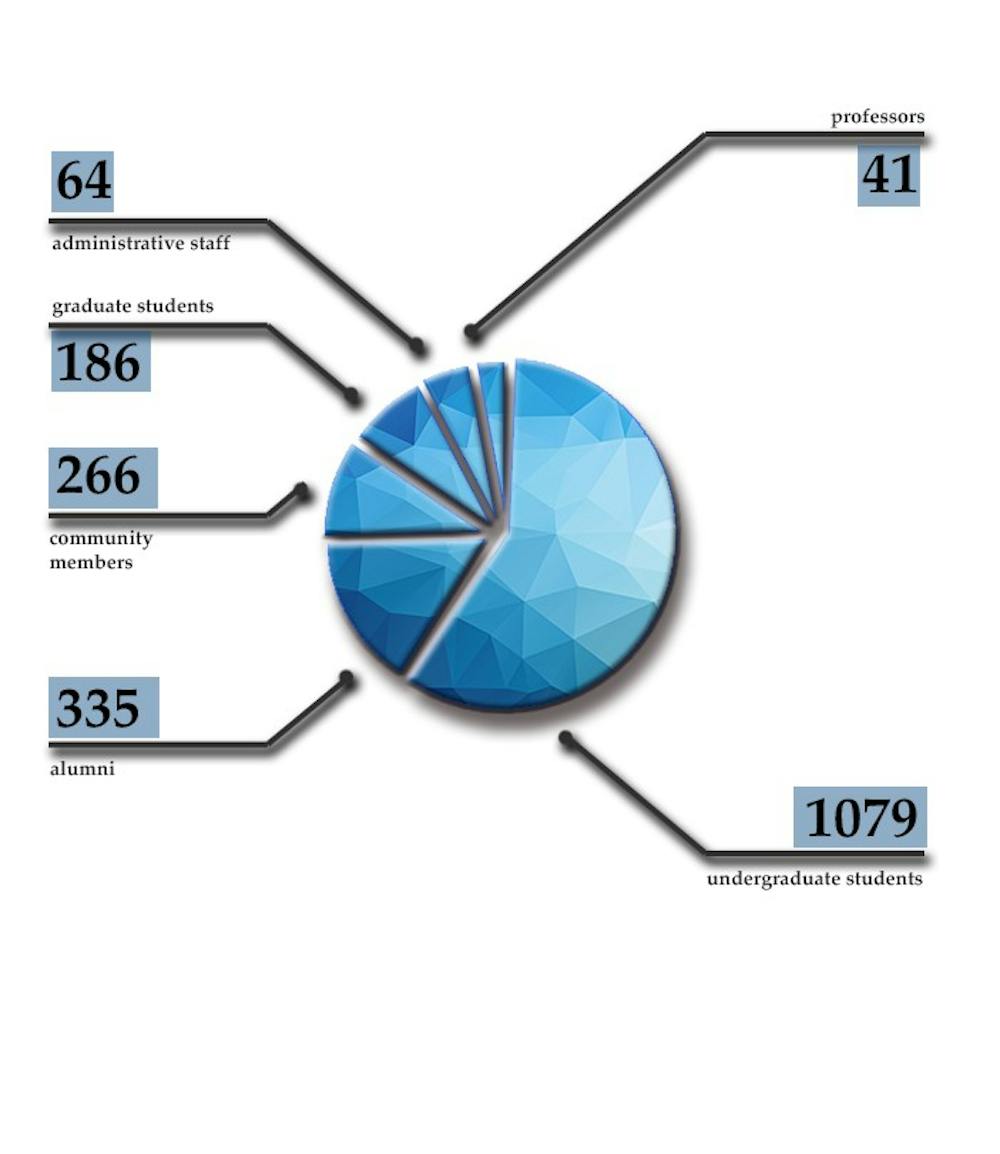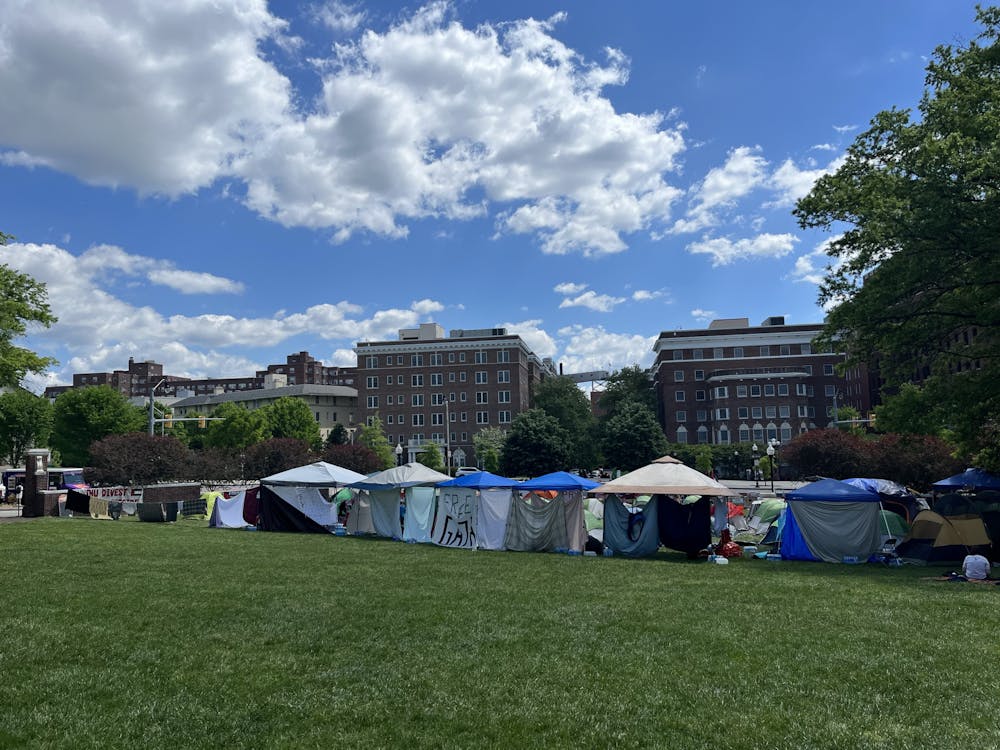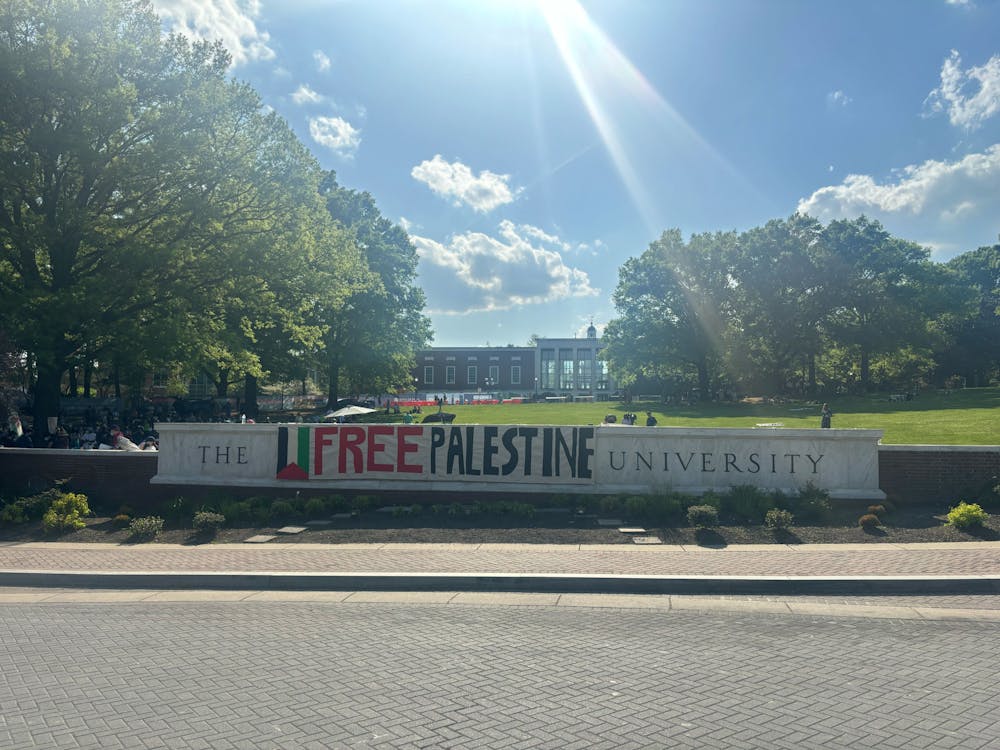In recent months, the Office of U.S. Immigration and Customs Enforcement‘s (ICE) mass deportation and detention of immigrants has sparked national controversy. Hopkins has been involved in a multi-million dollar contract with the agency since 2009. Many students, professors and alumni are criticizing the University’s partnership with the agency and are calling on the administration to sever ties.
Over the summer, Drew Daniel, associate professor and director of graduate studies in English, created an online petition to demand an end to all JHU-ICE programs. As of early September, the petition garnered 1,971 signatures.
In an interview with The News-Letter, Daniel stated that research-based institutions flourish with the support of an international network of people sharing ideas. He created the petition because this global sense of academia-based collaboration, which he thinks Hopkins stands for, is contradicted by its involvement with ICE.
“The trend towards what I see as extreme nationalism, fear and xenophobia towards foreigners and immigrants is in conflict with that international spirit,” he said. “I see this as a basic conflict of values.”
In an email to The News-Letter, Dennis O’Shea, executive director of media relations and crisis communications for the University, wrote that Hopkins is aware that a petition is circulating, but the administration has not received a copy of it.
Christopher Dreisbach, director of the Division of Public Safety Leadership (PSL) at the School of Education (SOE), explained that there have been two contracts with ICE. One contract ran from 2009 to 2013 and provided for-credit courses for students pursuing Master’s degrees. The current contract, which allows the government to spend up to $6.5 million, expires in September 2019. $4 million has been spent to date.
The current contract funds the PSL, which teaches leadership and management courses and workshops to employees of many police departments, law enforcement agencies and other public safety organizations at the local, state and federal levels.
“PSL is teaching four three-day, non-credit courses, with about 25 students in each,” Dreisbach wrote in an email to The News-Letter. “The courses are held at the Gettysburg National Battlefield Park. They focus on the leadership lessons to be learned from the Civil War.”
Dreisbech added that PSL currently does not have any ICE students in for-credit courses. This year, PSL is teaching four non-credit workshops on leadership and management for ICE employees.
According to a statement by SOE Dean Christopher Morphew in February 2018, PSL will end in December 2019. Current students are permitted to finish their degrees, but no new students will be admitted. Morphew stated that the program will end due to low enrollment and faculty turnover.
Hopkins is one of many universities with contracted programs with ICE, including Northeastern University, the University of Alabama at Birmingham and the Vermont State Colleges.
Students and community members at Northeastern University recently held a protest to sever their university’s partnership with ICE.
On Homewood Campus, several student organizations have opposed the University’s partnership with ICE.
In the weekly Student Government Association (SGA) meeting on Sept. 11, sophomore Class President Sam Schatmeyer introduced a bill that called for the end of the partnership between the University and ICE.
The bill cites reports of ICE officials detaining 2,342 children, with 500 children still not reunified with their parents.
The document stresses instances such as, “sexual abuse of minors by ICE officers; a denial of medical attention for the pregnant and the disabled; detention of minors beyond the federally mandated 72 hour holding window; graphic physical abuse of minors by ICE officers.”
Schatmeyer explained that although the University has many contracts with government agencies, these should be regarded on a case-by-case basis. According to him, the email that University President Ronald J. Daniels and Vice Provost Sunil Kumar sent out over the summer affirming the rights and dignities of undocumented students on campus was in contradiction with their contract with ICE.

He stated that although SGA is proposing this bill, it is reflective of the larger movement to oppose JHU-ICE partnerships that is occurring on campus. Schatmeyer said that he initially found out about this partnership through Daniel’s petition, which he signed and circulated around online.
Daniel’s petition arguing against the JHU-ICE program has signatures from 1,079 undergraduate students, 335 alumni, 266 community members, 186 graduate students, 64 administrative staff and 41 professors.
The petition reads, “Given the extent and extremity of its cruel practices and the scale of ongoing human rights charters which ICE continues to violate, we do not see how in good conscience Johns Hopkins University can collaborate with this organization.”
In an interview with The News-Letter, Schatmeyer said that this partnership seemed contradictory to his own personal beliefs about what the University represents.
“It seems hypocritical to me that I go to a liberal arts institution that supports the academic good, and this is not how you do that,” he said.
Schatmeyer explained that regardless of whether or not ICE students are currently participating in the University’s program, he still does not support the contract because, according to the PSL website, “all [PSL] programs support the ICE mission.”
He claims that the University contract with ICE sends the wrong message about what type of institution Hopkins is.
“[ICE] is an organization that separates little children from their mother’s arms. You can’t ask me to go out into the world and represent an institution that supports an institution like ICE,” he said.
Daniel noted that it is not only undergraduates who expressed their objections with the JHU-ICE contract. He said that he was excited to see so many alumni sign the petition, further reiterating Schatmeyer’s claim that University contracts affect students after they graduate.
“When you get a degree from an institution, for the rest of your life you represent that institution,” he said. “But it’s a two-way street; things that the institution does can also reflect on you and I think that’s what’s concerning here.”
In an email to The News-Letter, senior Sophia Diodati echoed these sentiments, arguing that because students represent the University, they have a right to voice their opinions.
“We have values as individuals and have the freedom and the right to affect the environment we exist in, benefit from and are both negatively and positively affected by,” she wrote.
Diodati added that she applauds student participation in protesting University contracts but is worries that student activism on campus is short-lived.
“The Hopkins students that do protest do it well simply because they do it, and they don’t stop doing it. And that’s beautiful,” she wrote. “However, where Hopkins students falter is that once the protest is over, once the moment has passed, it’s as if it never happened. The Hopkins bubble reappears, and we’re back in Brody.”
Programs such as Teachers and Researchers United (TRU) have also expressed their concern for the University’s involvement with ICE. Students in TRU set up a booth outside the Student Involvement Fair on Friday, Sept. 7 to engage undergraduate students with their call to end the contract.
TRU, in collaboration with Students Against Private Police (SAPP), is organizing a two-part protest at 9 a.m. on Friday, Sept. 21. Baltimore-based activist groups such as Jews United for Justice are also sponsoring this protest.
The event will start at the beach and consist of a “playdate” and a march. According to Samantha Agarwal, a fourth-year PhD student and member of the organizing committee for TRU, the concept of a “playdate” occurs in the migrant justice movement and is a way to expose the inhumane nature of forcible separations of families in the migrant community.
“Basically, what it looks like is a bunch of community members will come together with their children and have all kinds of activities to engage the children. These activities will have a kind of political message attached to them — that in our society we value when families are brought together,” she said.
Agarwal said that many of these community members will be middle-class white people, and that if the government was forcibly separating white children from their families, there would be an outrage.
“It’s unacceptable to separate any families, regardless of their color or their country of origin,” Agarwal said.
Directly following the playdate, there will be a rally and march. Different groups involved in organizing this protest, such as SAPP and TRU, will give speeches, calling on University President Ronald Daniels to end the current contract.
Agarwal acknowledged that the University’s claim of being a sanctuary campus is symbolically powerful, but in order for it to be true, Hopkins would have to cut its financial partnership with ICE.
“If Hopkins wants to send a message to the larger community that they are pro-migrant justice and are against the atrocities committed by ICE and have a stake in promoting a more just society, as they often claim they are doing, this is the first step,” Agarwal said.
She stressed the fact that institutions like ICE prevent undocumented workers from forming unions, which would allow safer working conditions and fair pay.
She said that individuals seeking asylum from other countries should not have to worry that ICE agents are going to conduct random searches. Agarwal added that these people, who could potentially need to seek legal help, are unable to get the help they need because ICE agents have targeted undocumented immigrants at places like courthouses.
In an email to The News-Letter, Dreisbach wrote that the contract provides funding for training for students that will allow them to serve their communities, but not to the agents who are deporting immigrants.
“We teach leadership and management. We do not teach law enforcement, and we do not prescribe operational approaches,” Dreisbach wrote.
Dreisbach wrote that the content of these programs is the same for other federal agencies and that these programs do not focus on issues specific to ICE or any other department.
Despite the University’s inactive role in the current workings of ICE, Agarwal said that the ties between the two need to be cut, seeing that Hopkins, as an institution, plays a large political role.
“Hopkins is a very strategic place for us to focus our interest, because they are one of the largest employers in Maryland, and they are so-called community leaders,” she said. “With this commitment to the community, they have to cut their ties to ICE.”
University officials have not commented on whether or not they will extend the contract with ICE.
Correction: Several of the quotes in this article were misattributed to Dennis O’Shea. They have been reattributed to the correct source, Christopher Dreisbach.
The original version of this article stated that PSL does not currently have any ICE students. PSL does not have any ICE students in for-credit classes this year but is teaching four non-credit courses for ICE employees.
The original article also stated that PSL is a program that intends to promote leadership and management skills for students from a variety of federal agencies. PSL actually teaches leadership and management courses and workshops to employees of many police departments, law enforcement agencies and other public safety organizations at the local, state and federal levels.

















Please note All comments are eligible for publication in The News-Letter.